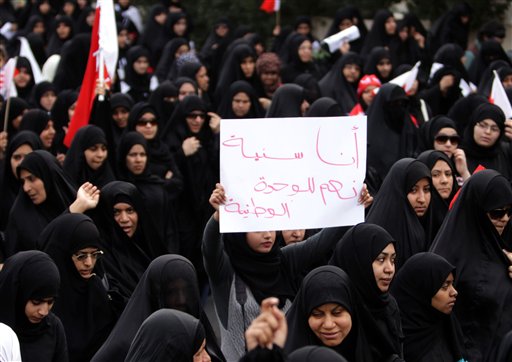MANAMA, Bahrain (AP) — Bahrain’s royal rulers have been saying for more than a week they are willing to talk with what has proved to be a resilient opposition movement. They have made little headway so far.
Rather than sit down at the negotiating table, anti-government protesters have been amplifying their calls for change by staging thousands-strong daily marches, increasingly into the capital’s central business district. Protest signs hanging from tent posts and makeshift food stalls in Pearl Square where many are camped out offer scant evidence they are willing to talk. “No dialogue with dictators” reads one.
A big reason for the impasse is that the opposition itself is divided on how far to push its demands.
Some groups, including the largest Shiite political bloc Al Wefaq, are pushing for democratic reforms within the existing political system, which is dominated by members of the Sunni royal family and its allies.
Many of the mostly young Shiite demonstrators who have taken over Pearl Square want more. They are let down by what they see as unfulfilled promises of reforms over the past decade, and are appalled by the government’s willingness to use lethal force to clear the square earlier this month.
“There is a problem of trust. People here don’t trust the king,” said Abdulhadi al-Khawaja, an independent activist and former president of the Bahrain Center for Human Rights. “People, especially the opposition, feel they were stabbed in the back. So now it’s very, very difficult to convince people in the street to go and sit with the crown prince and the king to negotiate the solution.”
On Wednesday, several hundred high school girls marched outside the offices of the foreign ministry and prime minister.
The lack of trust can be traced in part to the introduction of a new constitution in 2002 that opposition supporters say undid promised democratic reforms outlined in a widely popular referendum a year earlier.
What all opposition groups can agree on is a desire to give people a greater voice, alleviate unemployment, and free prisoners they say are held for political reasons.
There also appears to be little appetite for retaining as prime minister the king’s uncle, Sheik Khalifa bin Salman Al Khalifa, who has held the post for four decades.
Established opposition parties — a diverse group that includes Shiite Islamists and nonsectarian, secular leftists — are coming together to lay out a set of unified demands. They question the government’s willingness to give ground but appear open to negotiations.
“We don’t want a dialogue for the sake of dialogue, but a dialogue that results in a solution that satisfies all parties,” said Sheik Ali Salman, the leader of Al Wefaq.
The major opposition parties want the existing parliament to be dissolved and replaced with a constitutional monarchy governed by elected representatives. Britain is a frequently cited model, where the monarch is an important national unifier but has little political power.
Early on in the protests, it seemed that’s what many of those gathered in Pearl Square wanted, too. And some still do, according to interviews with demonstrators.
“All we are asking is for justice and to be treated fairly,” said Hussain Abdullah, 39, a small business owner who joined in the protests.
But others have grown more radical. One demonstrator Friday was seen standing over the crowds holding a gallows with a noose fashioned around a portrait of the prime minister. Others have plastered their tents with photos of government ministers on homemade wanted posters.
Many in the street are calling for the removal of the monarchy altogether.
“Everybody wants this family out,” said protester Jassim Haroon, 31.
That tension — between an old guard opposition accustomed to working within the system and a plugged-in but impatient and disaffected youth movement — makes it hard for dialogue efforts to move ahead, analysts say.
One figure whose role could prove decisive is Hassan Mushaima, a senior Shiite opposition figure who returned from self-imposed exile on Saturday. He heads a Shiite group known as Haq, which is considered more hard-line than other established parties.
Mushaima, a former political prisoner who broke away from Wefaq, enjoys an image as something of a political outsider. He was welcomed like a rock star at a Pearl Square rally hours after his return Saturday.
He has made a point of praising the “people of the square” and the youth of the Twitter and Facebook generation as the forces pushing for change in Bahrain.
“Lots of young people in Bahrain are fed up with all political factions,” said Jane Kinninmont, a senior research fellow at London-based think tank Chatham House, who has written a forthcoming book about Bahrain. “This unrest we’ve seen across the region this year has been a rejection of the (established) opposition movements as well as the existing governments.”
The government, for its part, appears eager to get the dialogue process in gear.
The crown prince on Monday called on all Bahrainis to “to start immediately the comprehensive national dialogue and to put an end to the harming of people’s interests,” according to a statement carried by the state-run Bahrain News Agency.
In Geneva on Tuesday, Bahrain’s social development minister said the crown prince has ordered all security forces away from protesters.
“They have been withdrawn. What we are trying is to have this dialogue with the people,” Fatima al-Balooshi told reporters. “The dialogue cannot happen in the streets.”
Al-Balooshi described the monarchy as fearful that the demonstrations could spiral out of control. Shiites, who account for about 70 percent of the country’s 525,000 people, have long complained of discrimination and other abuses by Bahrain’s Sunni rulers.
“We are really afraid of splitting the country, that there’s a very small line between having peace and having conflicts inside Bahrain,” she said. “We don’t want the monarchy to have civil war.”
___
Associated Press writer John Heilprin contributed from Geneva.








